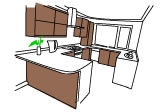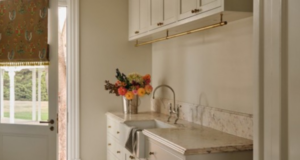
Taking proper care of your kitchen bench will help to ensure it maintains its looks and stays in shape – but different bench materials need different care. Find out how to clean and care for your benchtop.

Most people just grab a Chux and a bottle of Spray and Wipe and put their elbow into cleaning up spills on the benchtop, however certain surfaces benefit from specific cleaning methods.
Try to avoid spilling strong chemicals on your benchtop, over cleaners, oils, paint removers, acidic liquid all have an effect. If you do spill any of these liquids, quickly wash up the spill with some clean water.
Granite
Granite may be a heavy resistant material, but you still need to look after it and while the granite may come out unscathed, the sealant is still at risk of damage.
Granite is easy to keep clean. You should avoid abrasive cleaners and stick with the tried and true method of clean water. Wipe the surface dry with a soft cloth after cleaning. Stone care products do exist, just check with your manufacturer or supplier what best suits your needs.
Timber
Cleaning timber benchtops may be a little more complicated than granite or stone benchtops, however, the same rule applies with basic spills: clean them up straight away.
To maintain timber benchtops it is a good idea to conduct an annual reseal. This not only keeps the quality of the bench in tip top shape, but also decreases the build up of bacteria.
Do not clean the benchtop with any acid-based product, as the acid eats through the glue holding the bench together.
A simple detergent surface spray or daily use of warm soapy water will keep the bench clean.
Laminate
These are the cheapest of your benchtop options, but still need to be well maintained. When cleaning, you should avoid scourers and abrasives. These will not clean the surface, they will damage the surface. Like any surface hot objects and appliances do not act well with the surface, not does cutting straight onto the bench. Wax and polish will dull the natural shine and acid or alkaline cleaners won’t fare well either.
For any cleaning, simple is best. Soapy water or a household cleaning spray will remove streaks, grease and spills. Once you’ve wiped away the dirt, rub over the area with a dry cloth.
Engineered stone/quartz
Engineered stone or quartz benchtops are known for being less porous than granite and other natural stone benchtops. Everyday cleaning entails wiping down your bench with a cloth or paper towel – for tougher to remove marks you may need to use bleach to assist removal.
While the material is less porous than granite and other natural stones, as has already been mentioned, you will need to be vigilant against chipping your bench as if you are not careful it is perfectly easy to do so. However the artificial nature of engineered stone means you can repair the surface much more easily than you could with natural stone, as colour matches for small chips are easier to provide.
Acrylic
Made from another non-porous material, acrylic benchtops allow you to clean up after yourself with relative ease. Benches are both hygeniene-friendly and resistant to stains. For cleaning it is recommended that you simply apply a washing liquid and wipe it down.
The one major drawback of acrylic bench is their low tolerance of heat. Keep hot kitchenware – pots, bowls, pans and so on – from being exposed to the surface for prolonged periods and you should be fine.





